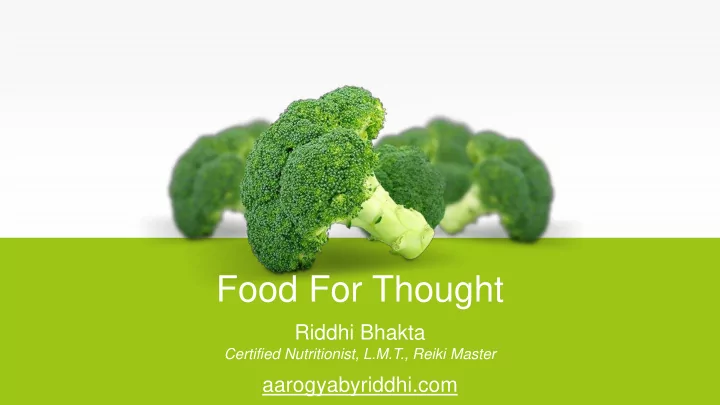

Food For Thought Riddhi Bhakta Certified Nutritionist, L.M.T., Reiki Master aarogyabyriddhi.com
01 Health: physical & mental well-being 02 Focus on self-care Agenda 03 Foods for brain 04 Anti-oxidants & vitamins 05 The bottom-line
What is “healthy”?
Being healthy We’re whole, mind, body and soul. Mind, body and soul were created to act as one. We 1 cannot have a healthy body without a healthy mind and vice-versa. Paanch pachis su patar niche, manava taal bajave; 2 Surat nurat ka mrudang baaje, chatris ragini gaave. Emotions are powerful and can manifest into 3 diseases. It is important that on a regular basis, we recognize, accept and process our emotions.
Food for thought Simple rules for a fit brain & a healthy mind Being grateful and positive thinking. 1 Regular brain boosting exercises. 2 Regular physical exercises. 3 Eating a healthy, well-balanced diet. 4
Focus on self-care Something bigger than us Body Mind Prayers Meditation Food Compassion, forgiveness, letting go Affirmations and visualization Exercise Nature walks, time-alone Journaling Annual Wellness Exams Spiritual Social Mental Physical Emotional Brain Relationships & Support Network Memory & focus games Age-based, specific interest groups Drawing or adult coloring books Community groups and giving Learning a new language or skill Face-to-face and heart-to-heart
Case for Carbs Your brain is the busiest organ of the body • It enables you to make decisions, read, speak, and perform hundreds of other actions instantly. • It’s responsible for several involuntary processes that are crucial for survival, including breathing, regulating body temperature, and secreting hormones. For most people: • It serves as the headquarters of the central nervous system, receiving and sending messages throughout your body. 1. Moderation is the key Your brain loves carbs 2. Choose smart carbs • Brain occupies only 2% of your body weight. • It consumes about 20% of your body’s oxygen. • It consumes up to 50% of your body’s glucose. 3. Low carb vs. No carb Glucose only vs. glucose + ketones for brain fuel • No right way or wrong way, both have benefits and side-effects. • Depends on age, life-style and medical condition. • Consult your nutritionist or physician based on your goals and conditions. • Some experts believe that using a combination of ketones and glucose may be great for people with Type 2 Diabetes and people with neurologic conditions such as Epilepsy, Alzheimers, Traumatic Brain Injury
Smart Carbs • Cauliflower • Okra Vegetables • Sabji, Salad Capsicum • Spinach • Kale • Berries • Cherries Fruits Snack • Grapefruit • Oranges • Peaches • Rice • Yellow mag daal, Green mag & Whole grains Staple Sprouts • Millet, Sorghum, Besan
Proteins for a healthy brain Growth and Maintenance, provides structure Muscles Mainly for the body tissues Causes Biochemical Reactions: Enzymes Enzymes from proteins aid in digestion, Energy Production, Blood Clotting, Muscle Contraction Body Hormones: Hormones Insulin, Glucagon, hGH, ADH, ACTH Bolster Immune System Antibodies Forms antibodies to protect our body from foreign Invaders
Sources of plant-based protein Hemp Add Text Add Text Lentils Chia seeds Quinoa Spirulina Simple PowerPoint Simple PowerPoint seeds Presentation Presentation Mungs Stir into soups Chia seed Add it in Khichdi Blend it in Daals Add to hummus, Pudding Add it in Salads smoothies Combine with dips Add into Add it in Wraps Add it in Juices Rice Sprinkle on smoothies Use it in soups Oatmeal Add it in Oatmeal ½ cup cooked = 2 Tablespoon = 8 Add into baked 7-9 grams of Grams of protein 1 cup cooked = goods 2 Tablespoons = Protein. 18 grams of 4 Grams protein 3 Tablespoons = 10 Grams of protein
Fats for a healthy brain Essential Fatty Acids Body doesn’t produce them. Required for Brain functions. Formation of Cell membranes. Required for O2 Transport. Un - Saturated Fats Sources: Avocados, Olive Oil, Nuts, Saturated Fats Sources : Cheese, butter, ice-cream, Coconut Oil Trans Fats Sources : Vegetable shortenings, Margarines, Fried fast-foods, Bakery products, Non-Dairy Coffee Creamers, potato chips
Vitamins, Omega-3, Selenium Vegetarian Multi-vitamins Selenium Vitamins, Folic Acid, B-Complex, Vitamin D, Minerals and Naturelo, Nutralite Food sources: Omega-3 and Supplements Walnuts, Brazil nuts, Sunflower seeds, Anti-oxidants for the brain Sources of Cottage cheese plant-based Omega-3 Supplements: Flax seeds, Hemp seeds, Global Healing Center Walnuts, Chia seeds Sam-e Sources of vitamins Helps produce and regulate and anti-oxidants hormones & maintain cell membranes Blueberries, Dark Chocolate, Goji Berries, Strawberries, Kale, Helps with mood swings & Red Cabbage, Beets, Turmeric. “feeling low”
The Bottom Line We’re whole, mind, body and soul. Paanch pachis su patar niche, manava taal bajave; Surat nurat ka mrudang baaje, chatris ragini gaave. Today’s important take -away 3
Recommend
More recommend